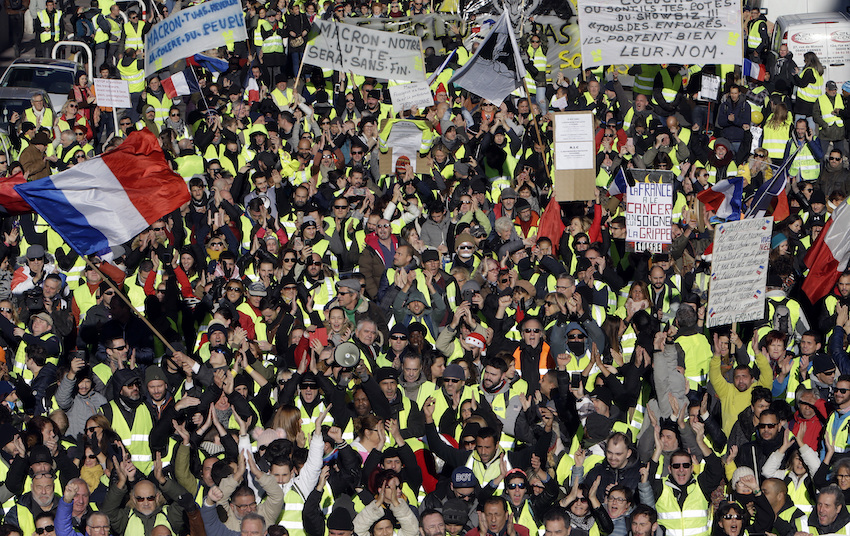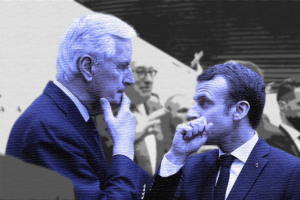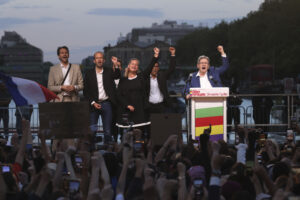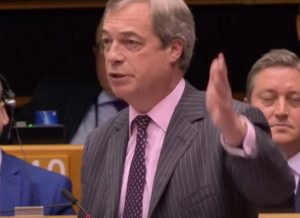Yellow Vest Protesters Go Global With Their Fight
More rounds of protests are in the works, and many believe a “social explosion” is on the horizon that ranges far beyond France's borders. "Yellow vest" movement supporters rally in Marseille, France. (Claude Paris / AP)
"Yellow vest" movement supporters rally in Marseille, France. (Claude Paris / AP)
Last weekend, the number of people protesting on the streets in Paris appeared to have shrunk considerably compared to demonstrations on previous weekends. The labor movement known by participants’ gilets jaunes (yellow vests) entered its fifth weekend of protest activity after the French government announced plans to raise taxes on gasoline and diesel fuel. The movement, with no identified leader and no official hierarchy, has drawn supporters around the country concerned about broader issues of economic inequality.
Though French President Emmanuel Macron made concessions on Dec. 10, including raising the minimum wage by 100 euros ($114) a month and cutting out a planned tax on pensions under 2,000 euros ($2,280) a month, many in Paris feel this is not enough and believe the central issue remains unresolved. They have rejected both the neoliberal agenda supported by some purportedly left-leaning officials—including Macron himself— and the trickle-down theory popular on the right.
Isabel, a 47-year-old unemployed single mother, stopped for a brief interview during the protests last weekend. “It’s apolitical. It’s not a movement about the right or the left,” she said on Saturday at Republic, one of the main meeting spots in Paris for the gilets jaunes.
Republic, in the city’s 20th arrondissement, contains a wide mix of cultures, from Algerian to Chinese to Middle Eastern as well as French people. It was one of the most heavily guarded and, eventually, tear-gassed areas during Act IV (the fourth weekend of protest activity) in Paris two weekends ago, and it was also heavily marked by the “casseurs” (breakers), whom officials accused of rioting. Before the French version of 2011’s Occupy Wall Street movement was dispersed, its encampment was set up in Republic.
The yellow-vest movement inspired Isabel to attend the first protests she’s ever joined. “I’m here for the poverty in the world. We want France to be the model,” she said.
The fuel-tax hike may have sparked the movement, but the outcry continues. “I work all day, six days a week, and by the 15th of the month, I am in the red. I am not accepting this anymore,” said a male protester (who asked to remain anonymous) at a gathering at Opera in Paris.
The marchers who were interviewed agreed that climate change is an issue that needs to be tackled, but not on the backs of the working poor. Isabel explained: “I am very worried about climate change, and I believe it is just a matter of time before the climate movement and the inequality movement will come together. But why are they charging the poor, who can’t survive a huge tax hike, while the rich pay no tax on fuel for their boats? … And there is no tax on kerosene for airlines.” This theme was repeated by protesters at multiple rally points across Paris.
Part of the plan for Saturday’s protest was to make it more decentralized, due to the new inability to gather in big crowds. Entryways to places such as Opera and the Champs-Elysées were blocked off by the police shortly after the protests began, and people inside those areas could only move slowly, one by one, through a police blockade. French government officials said these measures were necessary due to the violence of the casseurs and the destruction they caused to buildings and national monuments. Those small but impactive factions have been widely condemned by the government and the public.
But the new restrictions didn’t stop the streets from filling Saturday with small groups of people wearing yellow vests. In one group near Opera, a man from Bretagne, France (who also requested anonymity), said, “I drove four hours last night to be in Paris this weekend. I can’t even get inside.” It was supposed to be his first demonstration in Paris.
Zaïa, a 23-year-old animator for children’s entertainment, said, “We want to know where our money goes, and we want everyone to have the same advantage. We pay tax and that’s fine, but we want to know where it goes. Why are the ones at the top paying nothing? It doesn’t help us on the bottom.”
In his Dec. 10 speech, which was watched by more than 23 million people, Macron held firm on his pro-business policies. The former Rothschild banker has been viewed as the president of the rich since taking office and lifting parts of the impôt de solidarité sur la fortune, or solidarity tax on wealth. Macron said at the time that his action was intended to stimulate the economy and to convince companies leaving France due to high tax rates to return to the country’s business community.
Nikita (who used a pseudonym at the protests) explained that for him, the movement is not aimed specifically at Macron, nor is it about the fuel-tax hike (which he believes should have never been proposed); rather, it’s about the entire system in place that he believes needs to be overhauled. He feels France needs to model for the rest of the world how to fight economic inequality. “We save Paris, we save France, we save humanity,” he said simply.
He’s not alone in thinking big. In recent weeks, various unions, student groups and advocacy groups announced plans to stage protests in the future. A poll published by Institut français d’opinion publique (Ifop) last month suggested that two-thirds of the French population believe a “social explosion” is set to occur in coming months.
According to a December Ifop survey, 72 percent support the gilets jaunes movement but do not condone violence. Everyone interviewed by Truthdig at the protests also condemned the violence. The Ifop poll also found that Macron’s approval rating is hovering around 23 percent.
But not everyone in Paris sides with the gilets jaunes activists, and a substantial swath of the French population reportedly believes that the freeze in the fuel-tax rises should be enough to quell the protests.
French law student Margaux, 24, said that she doesn’t know if the movement will die down anytime soon. She was clear on one point, however: “The government has done practically nothing, and we aren’t happy.”
Your support is crucial…With an uncertain future and a new administration casting doubt on press freedoms, the danger is clear: The truth is at risk.
Now is the time to give. Your tax-deductible support allows us to dig deeper, delivering fearless investigative reporting and analysis that exposes what’s really happening — without compromise.
Stand with our courageous journalists. Donate today to protect a free press, uphold democracy and unearth untold stories.






You need to be a supporter to comment.
There are currently no responses to this article.
Be the first to respond.